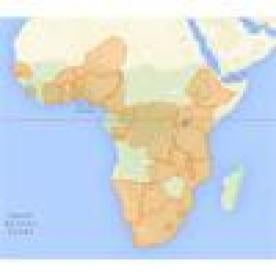The United States government in conjunction with the Bloomberg Philanthropies held the first ever US-Africa Business Summit on August 4–6, 2014 to discuss trade opportunities in Africa. A primary focus of discussion at the summit was the Africa Growth and Opportunity Act (AGOA), a regulation passed in 2000 to implement trade benefit provisions for sub-Saharan Africa. A major benefit of AGOA is allowing duty-free import of textile and apparel materials from beneficiary countries in Africa to the United States. This provision is currently set to expire on September 30, 2015 however, stakeholders in the textile and apparel industry, both in the US and Africa, are now advocating for its extension.
One of AGOA’s stipulations is the “third-country fabric provision.” which allows companies producing fabric in the 27 least-developed countries that are part of the pact to use fabric outside of the region and still receive duty-free benefits when their products are shipped to the US. According to Arvin Boolell, Minister of Foreign Affairs, Regional Integration and International Trade of Mauritius who spoke at an AGOA Civil Society Network event, “apparel exports to the U.S. increased 16% to $907 million under AGOA from 2000 to 2013”. Boolell said that the AGOA stipulations attracted about $500 million in new investment and created about 40,000 new jobs in Ethiopia, $20 million in new investment and 7,500 jobs in Kenya, $10 million in investment and 2,000 jobs in Uganda and a total of 352,000 jobs in Africa’s apparel and textile industry. According to the California Apparel News report of August 21, 2014, Bill McRaith, Chief Supply-Chain Officer for Phillips-Van Heusen (PVH), whose labels include Tommy Hilfiger and Calvin Klein, noted that because of the lower labor cost and its current duty free status, Africa appears to be the next solution for the United States for the sourcing of fabric and textile materials.
The United States textile and apparel industry has also benefitted from AGOA. In a statement made by the President of the United States Fashion Industry Association (USFIA), Julia K. Hughes, in conjunction with certain other six US and African industry and retail trade organizations, AGOA has also allowed US companies to produce quality, affordable apparel for their customers. Hughes noted that “without the duty-free treatment, sourcing apparel from the (AGOA) region is cost-prohibitive for many fashion brands and retailers, and since they plan their sourcing six to twelve months in advance, many are already considering leaving the region altogether.”
Against this backdrop, these stakeholders, including USFIA, the African Cotton and Textile Industries Federation (ACTIF), the American Apparel and Footwear Association (AAFA), the Footwear Distributors and Retailers of America (FDRA), the National Retail Federation (NRF), the Outdoor Industry Association (OIA) and the Retail Industry Leaders of America (RILA), have called on the United States government to fast-track the process of renewal of the program for at least 15 more years and to extend it to all AGOA beneficiaries and not just to the current 27 least-developed countries.


 i
i


